Introduction:
Introducing a comprehensive collection of Top SQL Scenario Based Interview Questions[Answered]:
Welcome to our comprehensive guide on SQL scenario-based interview questions. Structured Query Language (SQL) is the cornerstone of database management, enabling developers to store, retrieve, and manipulate data efficiently. In this guide, we present a series of scenario-based questions meticulously designed to evaluate your understanding of SQL concepts, query optimization, data modeling, and problem-solving skills.
Whether you’re a seasoned SQL developer or just beginning your journey with databases, these scenarios offer a practical and immersive way to test your knowledge and expertise. Each question simulates real-world scenarios encountered in database management and application development, covering a broad spectrum of topics including data manipulation, normalization, indexing, and transaction management.
By navigating through these scenarios, you’ll have the opportunity to demonstrate your proficiency in SQL, from crafting complex queries to optimizing database performance and ensuring data integrity. Whether you’re preparing for a SQL-focused interview or seeking to assess candidates’ capabilities, this guide serves as a valuable resource for honing your skills and gaining deeper insights into the intricacies of database management.
So, let’s embark on this journey together, delving into the world of SQL through immersive scenarios that will challenge and inspire you along the way. Whether you’re a job seeker aiming to excel in SQL interviews or an interviewer looking to evaluate candidates’ database skills, this guide is your roadmap to mastering SQL and unlocking the full potential of data-driven applications.
Let’s dive in and explore the realm of SQL through practical scenarios that will expand your knowledge and elevate your expertise in database management and application development.
![Top SQL Scenario Based Interview Questions[Answered]](https://algo2ace.com/wp-content/uploads/2024/05/Blue-Gradient-Modern-Freelancer-YouTube-Thumbnail-1-1024x576.png)
Top SQL Scenario Based Interview Questions[Answered]
1. Scenario: You have a table named Employees with columns EmployeeID, FirstName, LastName, and Salary. You need to find the average salary of all employees. How would you write an SQL query to accomplish this?
SELECT AVG(Salary) AS AverageSalary
FROM Employees;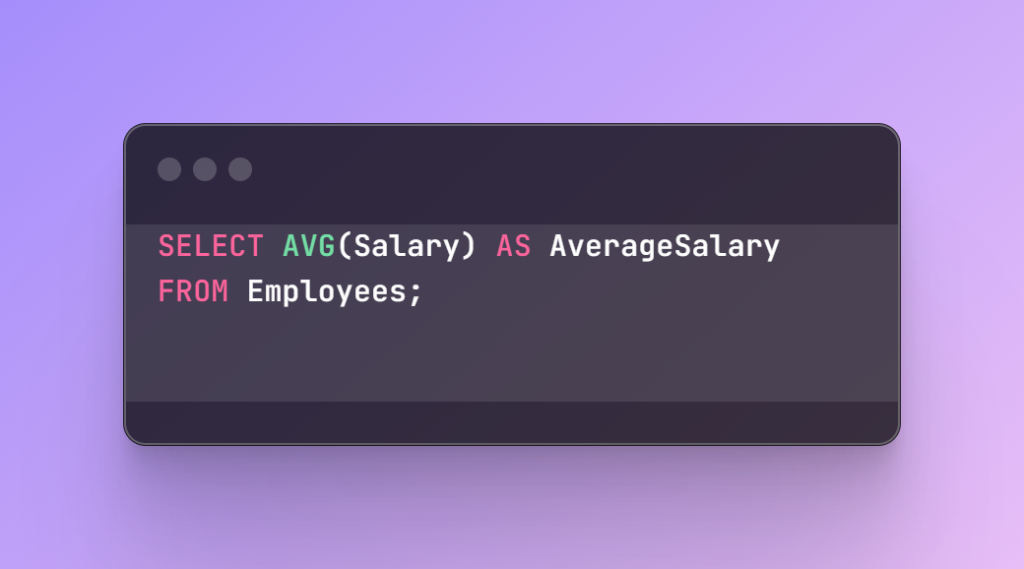
2. Scenario: You need to retrieve the top 5 highest-paid employees from the Employees table. How would you write an SQL query to achieve this?
SELECT *
FROM Employees
ORDER BY Salary DESC
LIMIT 5;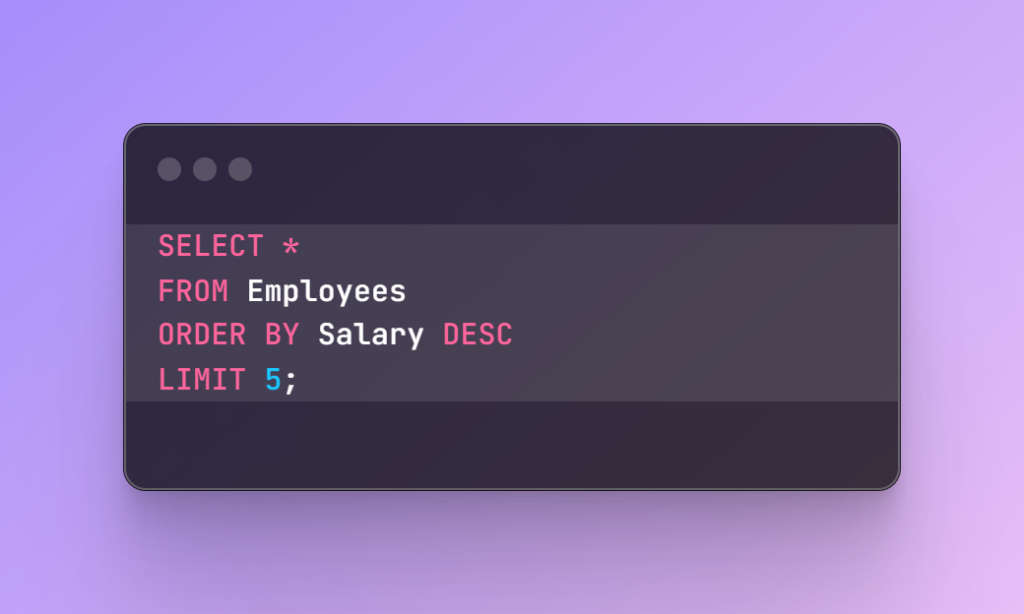
3 .Scenario: You want to calculate the total sales revenue for each product category from a table named Sales with columns ProductID, CategoryID, and Revenue. How would you write an SQL query to calculate this?
SELECT CategoryID, SUM(Revenue) AS TotalRevenue
FROM Sales
GROUP BY CategoryID;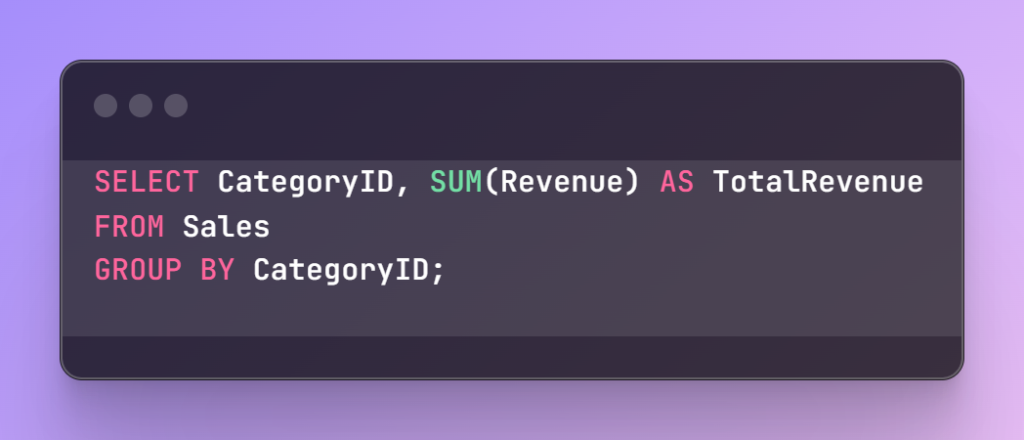
4. Scenario: You have two tables, Orders and Customers, with columns OrderID, CustomerID, and OrderDate, and CustomerID, FirstName, and LastName respectively. You need to retrieve the first name, last name, and total number of orders for each customer. How would you write an SQL query to accomplish this?
SELECT c.FirstName, c.LastName, COUNT(o.OrderID) AS TotalOrders
FROM Customers c
LEFT JOIN Orders o ON c.CustomerID = o.CustomerID
GROUP BY c.CustomerID, c.FirstName, c.LastName;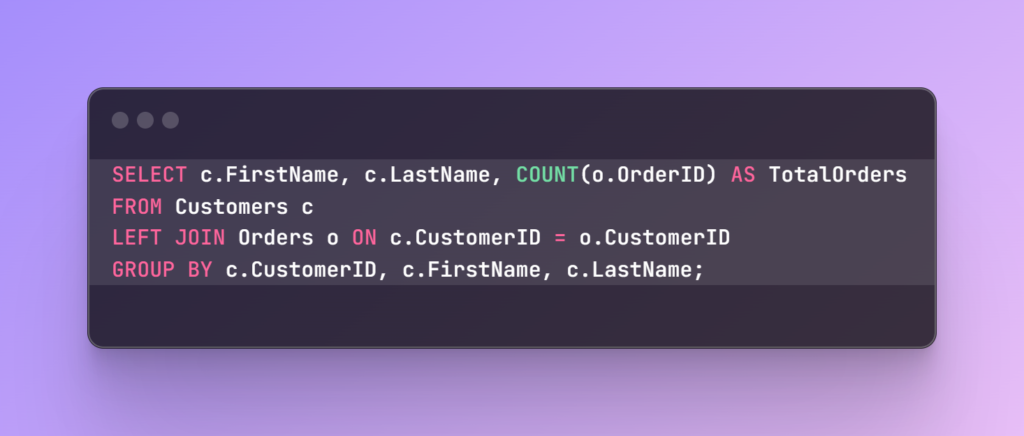
5. Scenario: You need to find all employees who have a salary greater than the average salary of all employees. How would you write an SQL query to retrieve this information?
SELECT *
FROM Employees
WHERE Salary > (SELECT AVG(Salary) FROM Employees);![Top SQL Scenario Based Interview Questions[Answered]](https://algo2ace.com/wp-content/uploads/2024/05/ray-so-export-20-1024x474.png)
6. Scenario: You have a table named Products with columns ProductID, ProductName, and CategoryID, and another table named Categories with columns CategoryID and CategoryName. You need to retrieve the names of products along with their corresponding category names. How would you write an SQL query to achieve this?
SELECT p.ProductName, c.CategoryName
FROM Products p
INNER JOIN Categories c ON p.CategoryID = c.CategoryID;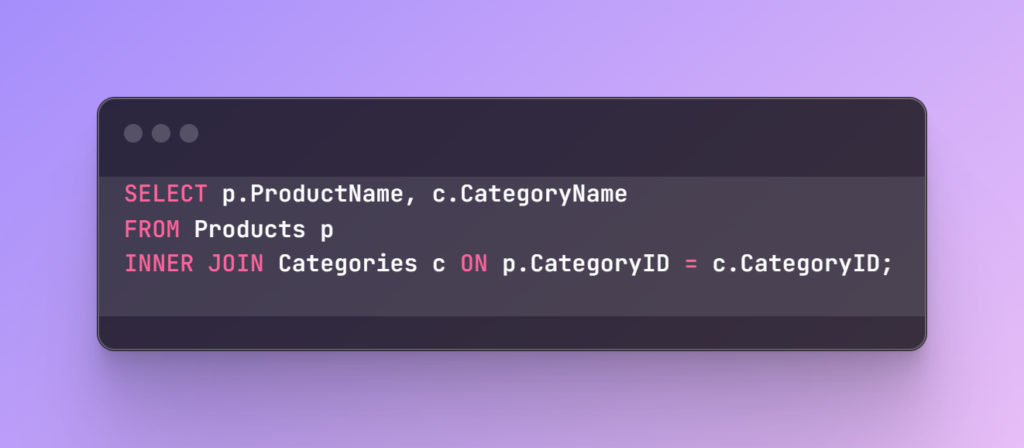
7. Scenario: You want to update the salary of all employees by adding a 10% bonus to their current salary. How would you write an SQL query to perform this update?
UPDATE Employees
SET Salary = Salary * 1.1;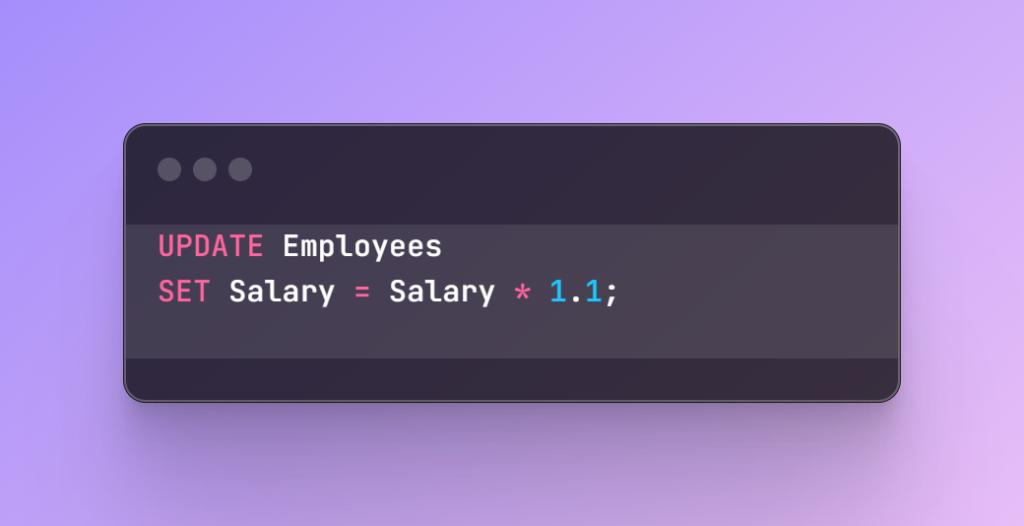
8. Scenario: You have a table named Transactions with columns TransactionID, CustomerID, Amount, and TransactionDate. You need to find the total revenue generated from transactions in the last month. How would you write an SQL query to calculate this?
SELECT SUM(Amount) AS TotalRevenue
FROM Transactions
WHERE TransactionDate >= DATEADD(MONTH, -1, GETDATE());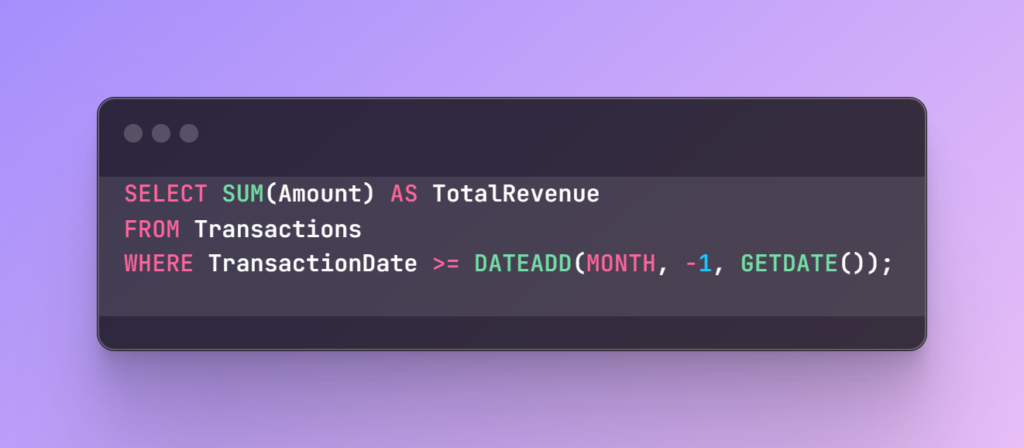
9. Scenario: You have a table named Students with columns StudentID, FirstName, LastName, and DateOfBirth. You need to find the age of each student in years. How would you write an SQL query to calculate this?
SELECT StudentID, FirstName, LastName,
YEAR(GETDATE()) - YEAR(DateOfBirth) -
CASE WHEN DATEADD(YEAR, DATEDIFF(YEAR, DateOfBirth, GETDATE()), DateOfBirth) > GETDATE() THEN 1 ELSE 0 END AS Age
FROM Students;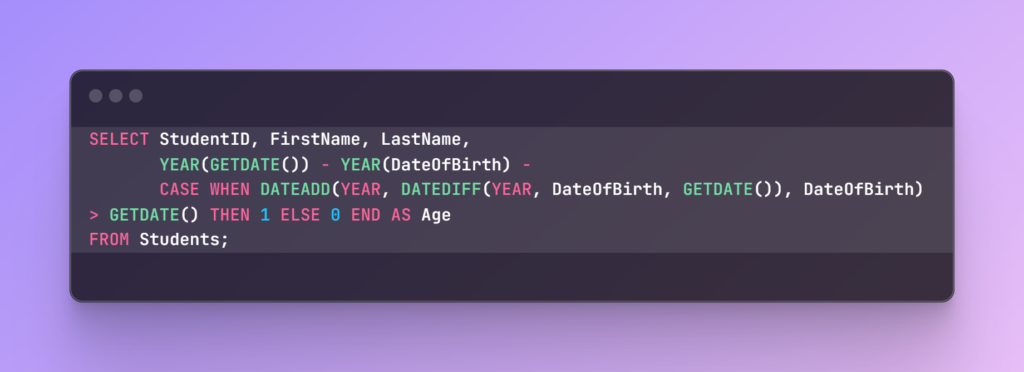
10. Scenario: You need to find the top 3 most frequent words in a column named Text from a table named TextData. How would you write an SQL query to accomplish this?
SELECT Text, COUNT(*) AS Frequency
FROM TextData
GROUP BY Text
ORDER BY Frequency DESC
LIMIT 3;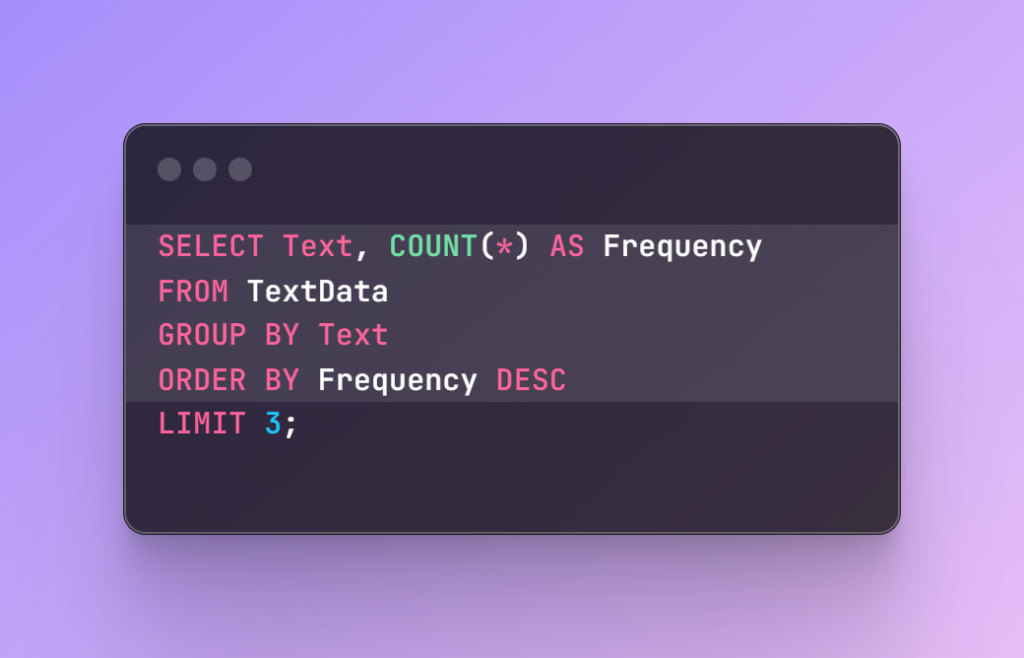
Reference:
SQL Interview Questions For 3 Years Experience
Conclusion:
Concluding our exploration of SQL scenario-based interview questions, we trust you’ve gained valuable insights into the intricacies of database management and SQL query optimization. These scenarios were carefully crafted to challenge your understanding of SQL fundamentals, problem-solving abilities, and ability to design efficient database solutions.
By navigating through these scenarios, you’ve demonstrated your proficiency in SQL, from crafting intricate queries to ensuring data integrity and optimizing database performance. Whether you’re a seasoned database developer or a newcomer to SQL, these scenarios have provided a platform for learning, growth, and mastery of database management concepts.
SQL remains a cornerstone of modern data-driven applications, and your understanding of its principles is invaluable in today’s tech landscape. As you continue your journey with SQL, remember to stay curious, explore new features and best practices, and keep refining your skills to stay ahead in the ever-evolving world of database management.
We hope this guide has been instrumental in your preparation for SQL-focused interviews, equipping you with the knowledge and confidence to tackle any database challenge with ease. Whether you’re seeking to advance your career, land your dream job, or simply deepen your understanding of SQL, may your journey be filled with success and fulfillment.
Good luck on your SQL endeavors, and may you continue to excel in building robust, scalable, and efficient data-driven applications!
